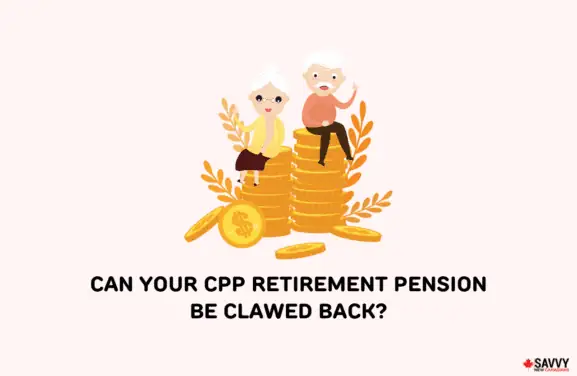Should I take CPP early at age 60, wait until the standard 65 years, or defer CPP benefits until I’m 70 years old?
I get these questions a lot from readers, and while I do not consider myself an expert on retirement planning, I will share my thoughts on when to collect CPP in this post and in a second one that covers the reasons to take CPP at age 70.
Contact a certified financial planner for a more robust assessment of your financial situation and how CPP timing can affect your retirement nest egg.
Related: RRSP Withdrawals Explained.
How Much CPP Will I Get at Age 60?
For 2024, the maximum monthly CPP payment is $1,364.60 or $16,375.20 per year. If you start collecting CPP at age 60, your monthly payment is 36% lower at $873.34 or $10,480.12 per year.
It is worth noting that the average CPP benefit paid out to seniors is much lower than the maximum amount at $758.32 per month (as of last October).
So, if you qualify for the average monthly payment, your monthly CPP benefit at age 60 is $485.32 (i.e. $717.15 x 64%).
CPP Basics
The amount of CPP you receive depends on how long and how much you contributed to the plan. Unlike the OAS pension, which is paid out of government coffers, CPP is funded through workers’ (and employers’) contributions.
The standard age to start taking CPP is 65 years.
You can choose to take CPP early, starting at age 60, in return for a reduction in benefits equivalent to 0.6% for every month before your 65th birthday, i.e. a decrease of 7.2% per year or 36% total by the time you turn 65 (0.6% x 60 months).
Alternatively, you can choose to delay taking CPP until as late as age 70 in exchange for a permanent increase in benefits equivalent to 0.7% for every month before your 70th birthday, i.e. 8.4% per year or an increase of 42% total at age 70.
The problem many seniors find themselves in is whether or not it makes financial sense to apply for CPP as soon as they are eligible from age 60.
The answer is not straightforward, and you will need to look closely at factors, including your expected income, health, life expectancy, expenses, etc.
Related: LIRA, LRSP, LIF, PRIF Explained

Reasons To Take CPP Early At Age 60
Government data shows that most Canadians start collecting CPP as soon as they turn 60. Even though you will get a boost in payout by waiting until you are 70 years of age, most Canadians cash out earlier.
Here are five reasons for taking CPP at 60:
1. You Need The Money Now: If you are hard for cash and have no other significant income sources to rely on, you may have no choice but to start collecting CPP immediately to cover your expenses.
This also applies if you are carrying high-interest credit card debt… it makes financial sense to pay it off quickly rather than wait.
2. Poor Health Considerations: If you face health challenges that shorten your life expectancy, taking CPP as soon as you qualify makes sense. The breakeven point for taking CPP at 60 vs. taking it at 65 is around age 74. When it’s unlikely that you will live past 74 years, the math says it’s better to take CPP early.
Other considerations that may factor into your life expectancy include your family health history. As per Statistics Canada, the expected life expectancy of a 60-year-old male is another 20.5 years (i.e. 80.5 years), and for a 60-year-old female, it is 25 years (i.e. 85 years).
If your health challenges qualify as a disability and you meet the contributory requirements, a CPP Disability benefit is better than taking your CPP retirement pension early.
3. Lifestyle Expectations: If you plan to ‘live it up’ during your initial years of retirement, you may need the extra CPP income to maintain your lifestyle during these active years with a plan to spend less as you get older.
Want to travel the world? It’s best to get to it while you still have the desire and energy!
4. Investment Return Expectations: If your investments (e.g. TFSA and RRSP) are providing a healthy rate of return, you may want to take CPP early, so your investments continue to compound.
If you are earning a measly 1-2% on GICs or savings, an argument could be made for withdrawing from these savings first before taking CPP.
A 7.2% increase in CPP per year (or 8.4% per year after age 65) is tough to beat, especially if you don’t need the money right now.
5. You Have Stopped Working: If you are under 65 and are still working, CPP contributions are mandatory and will increase your future retirement income. Also, if you are still working, the additional income from CPP may bump you into a higher tax bracket.
If you are no longer working, delaying CPP benefits may/may not be beneficial depending on how your non-contributory years factor into your CPP calculation. CPP dropout provisions allow you to exclude up to 8 years when your earnings are the lowest.
Related: 5 Reasons to Delay CPP Till Age 70.
Reasons for not taking CPP early at age 60
An obvious increase in benefits if you delay when you start collecting.
There is a longevity risk that you may live longer than expected and have to make do with the reduced benefits permanently.
If your main reason for taking CPP benefits early is so you can invest the funds for higher returns, take a moment to consider reality.
Is your risk tolerance a match for a portfolio that returns 7.2% per year on average after investment fees? The fact is that not much out there is as guaranteed as your government-paid and inflation-indexed CPP benefit.
How To Apply for CPP at Age 60
You can apply for CPP online or by using a paper application form.
Online: Visit your My Service Canada Account to apply. You should expect a decision between 7 and 14 days.
Paper: Complete the Application for a Canada Pension Plan Retirement Pension form (ISP-1000) and mail or drop it off at a Service Canada office. Paper applications take longer to process and may take up to 3 months.
Related reading





I’m all-in on #1, 2 and 5.
As far as #3 goes, I would say drawing down RRSPs is the way to go to supplement ‘living it up’ in the early years. You get the money out at a lower tax rate as well if you’re not collecting CPP.
For #4, people are not as good at investing as they think they are. lol
Really good points, thanks for writing this article.
Steve
I would agree with the entire article including Steve’s comment on using other funds to live it up during your earlier years. I have read many articles on this over the years and this has been one of the best.
Love the fact that he pointed out if you owe on high interest credit cards to pay that off ASAP using early CPP if you have to.
If you think you can draw it early and earn an average rate of return higher than the approximately 7% your guaranteed ask yourself why you would even need the money early. You should be debt free with a lot of money to spend as you are such a great investor.
“Always live below your means” and strive to never pay credit card interest.
Jeff
It sounds like CPP is very much like our Social Security, which grows by 8% for each year you delay taking it. Here though, when one spouse dies the remaining spouse get the higher of their benefit or the dead spouses for the rest of their life. So if there is a big difference in the amount one spouse gets then another consideration is to delay taking the larger spouses benefit until age 70 because usually at least one spouse will live to an advanced age and the larger benefit will pay out the lost money from the delay. That may not work with CPP. You guys up North usually have a better designed system than we do but maybe in this case they are about the same.
I have been toying with the idea of whether to take it or not. This makes sense to me. My neighbour (who was a financial banker) thinks I should take it now (I’m 62) and invest it in the TFSA. I am still working and plan to do so until I’m 65/67 depending on my health so I think I should wait and take it at 65 to maximize the monthly amount. I think it’s more or less a personal choice. I do not need it now as I have monthly income so in my mind I should wait until I’m 65 to take it. I can see if you need it to supplement an income take it early but the benefits point to taking it later even though I may not live that long. Thank you for the great article.
@Jan: Thanks for your feedback!
The one point that seems to be missed, is that if you take it early, you accumulate the cash to either spend or pass on. Ex. $452 (average at 65) 60 month equals $27,120. You can expect a return of 5%, Bank of Nova Scotia 4.5% dividend yield plus capital gain.